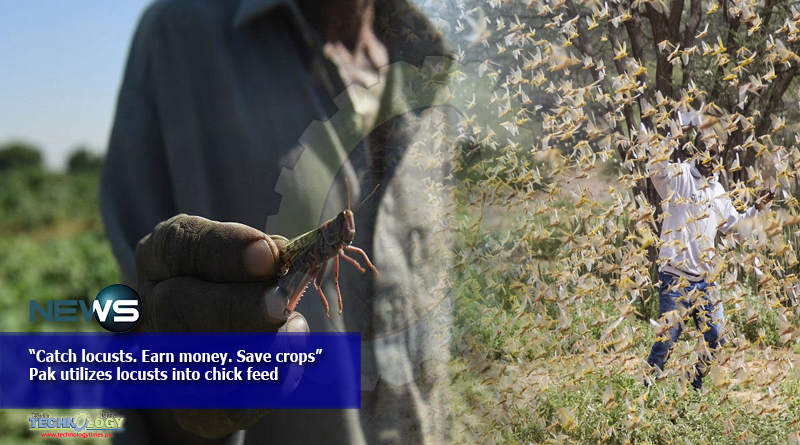Pakistani scientists have successfully tried a simple solution to turn the pests into protein and income amid the worst swarms for decades. As the biggest locust swarms for more than 25 years threaten Pakistan’s breadbasket regions now Pakistan is using locusts as chick feed.

Using the slogan, “Catch locusts. Earn money. Save crops”, the project offered to pay farmers 20 Pakistani rupees (USD 0.12) per kilogram of locusts for chick feed as it is highly proteinaceous.
Locusts only fly in daylight. At night, they cluster on trees and open ground without dense vegetation and remain almost motionless till sunrise the next day. Locusts are easy to catch at night.
Towards the end of May and in June and July, high-level migration is expected,” warns Tariq Khan, director of the Technical Department of Plant Protection in Pakistan’s Sindh province.
Farmer Ghulam Sarwar Panhwar saw millions of the pests devour his cotton and moringa crops in just a few hours. “This was their second attack this month. With locusts attacking our crops during the day, bats attacking our mango orchards at night and coronavirus attacking us in our homes day and night, where do we go?” asks Panhwar, who owns two farms totaling 300 acres in the Hyderabad district of Sindh.
The pesticides used by the government are carcinogenic to humans and poisonous to wildlife, warns Sohail Ahmed, an animal biologist at the University of Agriculture in Peshawar. “No bio-safe pesticide is being used at the moment. These chemical sprays are toxic to the environment and will affect humans, wildlife, and livestock.”
With the locust problem escalating, an innovative pilot project in Pakistan’s Okara district offers a sustainable solution in which farmers earn money by trapping locusts that are turned into high-protein chicken feed by animal feed mills.
It was the brainchild of Muhammad Khurshid, a civil servant in the Ministry of National Food Security and Research, and Johar Ali, a biotechnologist from the Pakistan Agricultural Research Council.
“We were mocked for doing this – no one thought that people could actually catch locusts and sell them,” says Ali.
Khurshid says they were inspired by an example in Yemen in May 2019. The motto in that war-torn country facing famine was, “Eat the locusts before they eat the crop.”
They selected Okara district, as it is a heavily populated rural area of Pakistan’s Punjab. They set up a three-day trial project in the Forest in Depalpur, where huge swarms of adult locusts were reported in mid-February 2020. The forest area was chosen as it was less likely to be contaminated by the insecticide.
